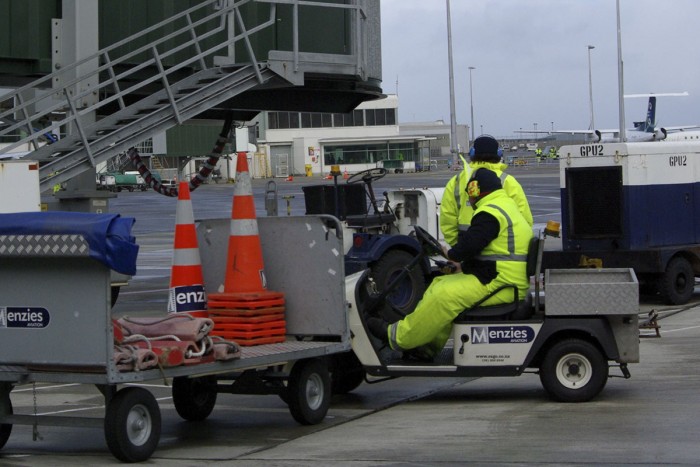Aircraft Loader
Kaiuta/Kaihoroi Waka Rererangi
Alternative titles for this job
Aircraft loaders load and unload aircraft, and transfer freight and baggage between airport buildings and aircraft.
Pay
Aircraft loaders usually earn
$24-$29 per hour
Source: Air New Zealand, 2018.
Job opportunities
Pay
Pay for aircraft loaders varies depending on experience.
- Aircraft loaders start on about $24 an hour.
- Senior aircraft loaders or team leaders can earn $25 to $29 an hour.
Many aircraft loaders work part-time hours.
Source: Air New Zealand, 2018.
- PAYE.net.nz website - use this calculator to convert pay and salary information
- Employment New Zealand website - information about minimum wage rates
(This information is a guide only. Find out more about the sources of our pay information)
What you will do
Aircraft loaders may do some or all of the following:
- drive baggage and freight between planes and airport terminals or cargo buildings
- load and unload aircraft
- operate equipment such as cargo and belt loaders, lift trucks, ramp tractors and loading systems
- help position loading ramps, passenger ramps and other equipment
- help guide planes into their berth and secure the aircraft
- drive aircraft tugs, which push or pull planes into position on the runway or tarmac.
Skills and knowledge
Aircraft loaders need to have:
- knowledge of baggage and freight handling, as well as stacking and lifting techniques
- knowledge of how to handle hazardous goods
- an understanding of airport regulations and procedures, and safety and emergency procedures
- driving skills for operating specialist vehicles such as aircraft tugs.
Working conditions
Aircraft loaders:
- usually work shifts, including weekends or evenings, and may work casually, part-time or full-time
- spend most of their time outside on the tarmac, in aircraft cabins and baggage holds, and baggage sorting rooms
- work in most types of weather, and in conditions that may be fumy and noisy.
What's the job really like?

Richard Jones
Aircraft Loader
Richard Jones's career has swerved between planes, trains and automobiles. While currently working as an aircraft loader, his CV also includes locomotive engineer and courier driver work. He only intended to be a loader for a short time, but he now has six years up his sleeve and no intention of leaving.
What do you like about this work?
"You get travel perks, the money's reasonable and it's low stress. I also love being outside – on a nice sunny day, when you're in your shorts in the sun, it's great."
What's the biggest challenge?
"Physically it's challenging. You get injuries and they are hard to heal. Muscle tears in our shoulders are common because we're lifting above our shoulders. But that's the nature of the work, so you just have to try and keep on top of it."
What's an important skill to have as an aircraft loader?
"We have to work as a team, as things can get really busy and we have to depend on each other to get things done. Everybody has to know what they're doing."
Entry requirements
There are no specific requirements to become an aircraft loader. However, a New Zealand Certificate in Aviation (Ground Handling) may be useful.
A New Zealand driver's licence is usually needed.
- New Zealand Transport Agency website - information on getting a driver's licence
- ServiceIQ website - information on the New Zealand Certificate in Aviation (Ground Handling)
Secondary education
There are no specific secondary education requirements to become an aircraft loader. However, construction and mechanical technologies, physical education, maths and English are useful.
Personal requirements
Aircraft loaders need to be:
- quick-thinking and able to make good judgements
- able to work well under pressure
- accurate, methodical and patient in their work
- able to work well independently and in a team
- safety-conscious
- good communicators.
Useful experience
Useful experience for aircraft loaders includes:
- work at an airport
- work with heavy machinery and vehicles
- labouring
- warehouse work
- work in a team
- any work involving heavy lifting.
Physical requirements
Aircraft loaders need to be reasonably fit and strong, with strong backs and good stamina, because they need to lift heavy items. They also need to be able to bend, stoop and work in tight spaces.
Find out more about training
- ServiceIQ
- 0800 863 693 - info@serviceiq.org.nz - www.serviceiq.org.nz
What are the chances of getting a job?
Regular vacancies despite declining number of aircraft loaders
Vacancies for aircraft loaders arise reasonably often as many leave the job after a short time to move into other roles, or more senior positions. However, the number of aircraft loaders working in New Zealand is declining as some are not being replaced when they leave the job.
Opportunities for aircraft loaders are best at Auckland International Airport and Christchurch International Airport, as these are two of New Zealand's busiest airports.
According to the Census, 1314 aircraft loaders worked in New Zealand in 2018.
Part-time work can lead to full-time aircraft loader job
People often get into aircraft loading by doing casual or part-time baggage handling. Casual or part-time positions are available throughout the year, though summer can be a good time to apply as airlines are usually busier then.
Most aircraft loaders work for one of two companies
Aircraft loaders either work directly for Air New Zealand, or for companies that supply contractors to airlines.
The largest of these companies is Menzies Aviation, which supplies aircraft loaders to many airlines.
Sources
- Air New Zealand, careers.govt.nz interview, April 2018.
- Stats NZ, '2018 Census Data', 2019.
- Stuck, M, general manager Auckland, Menzies Aviation, careers.govt.nz interview, April 2018.
(This information is a guide only. Find out more about the sources of our job opportunities information)
Progression and specialisations
Aircraft loaders may progress to work as team leaders or managers.
Last updated 24 March 2025

